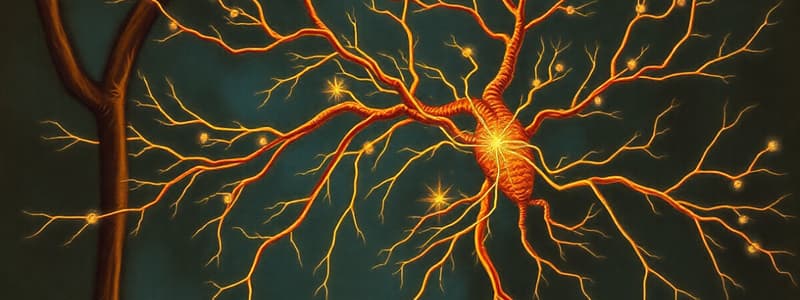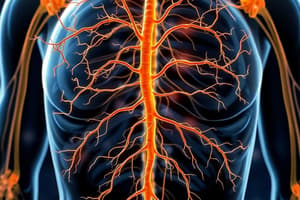Podcast
Questions and Answers
Which of the following correctly defines the autonomic nervous system?
Which of the following correctly defines the autonomic nervous system?
- A system that transmits signals only to the spinal cord.
- A system that regulates visceral functions without consciousness. (correct)
- A system that only processes sensory information.
- A system that regulates voluntary muscle movements.
What is the primary role of synapses in neuron communication?
What is the primary role of synapses in neuron communication?
- To store neurotransmitters before they are released.
- To facilitate the conversion of chemical signals back into electrical signals.
- To enable nerve impulses to pass between neurons. (correct)
- To generate bioelectrical signals.
What term is used to describe fibers that carry signals out of a ganglion?
What term is used to describe fibers that carry signals out of a ganglion?
- Postganglionic fibers (correct)
- Afferent fibers
- Presynaptic fibers
- Efferent fibers
In the process of neuron communication, what occurs at the axonal terminal?
In the process of neuron communication, what occurs at the axonal terminal?
Which of the following fibers primarily transmits neuronal messages from the periphery to the central nervous system?
Which of the following fibers primarily transmits neuronal messages from the periphery to the central nervous system?
What is the primary function of preganglionic fibers?
What is the primary function of preganglionic fibers?
What characterizes the chemical transmission in the autonomic nervous system?
What characterizes the chemical transmission in the autonomic nervous system?
Which of these statements about somatic nerves is incorrect?
Which of these statements about somatic nerves is incorrect?
Which neurotransmitter is primarily associated with the sympathetic nervous system?
Which neurotransmitter is primarily associated with the sympathetic nervous system?
What physiological effect occurs during sympathetic activation?
What physiological effect occurs during sympathetic activation?
What is the primary role of the enteric nervous system?
What is the primary role of the enteric nervous system?
Which of the following is NOT a characteristic action of the sympathetic nervous system?
Which of the following is NOT a characteristic action of the sympathetic nervous system?
What is the function of the autonomic ganglia in the sympathetic nervous system?
What is the function of the autonomic ganglia in the sympathetic nervous system?
During which state does parasympathetic activity predominates?
During which state does parasympathetic activity predominates?
Which of the following correctly describes the organization of the autonomic nervous system?
Which of the following correctly describes the organization of the autonomic nervous system?
What is one of the effects of the parasympathetic nervous system on heart activity?
What is one of the effects of the parasympathetic nervous system on heart activity?
Which neurotransmitter is primarily associated with the postganglionic neurons in the parasympathetic nervous system?
Which neurotransmitter is primarily associated with the postganglionic neurons in the parasympathetic nervous system?
What effect does the parasympathetic nervous system have on heart rate?
What effect does the parasympathetic nervous system have on heart rate?
Which type of receptor is primarily activated by acetylcholine in skeletal muscle?
Which type of receptor is primarily activated by acetylcholine in skeletal muscle?
What is a characteristic action of the parasympathetic nervous system regarding glucose metabolism?
What is a characteristic action of the parasympathetic nervous system regarding glucose metabolism?
What type of neurons link the central nervous system directly to skeletal muscle fibers in the somatic motor system?
What type of neurons link the central nervous system directly to skeletal muscle fibers in the somatic motor system?
Which of the following is NOT a main neurotransmitter involved in the autonomic nervous system?
Which of the following is NOT a main neurotransmitter involved in the autonomic nervous system?
Which effect on the gastrointestinal activity does the parasympathetic nervous system exert?
Which effect on the gastrointestinal activity does the parasympathetic nervous system exert?
What type of receptor does noradrenaline primarily act upon in the sympathetic nervous system?
What type of receptor does noradrenaline primarily act upon in the sympathetic nervous system?
What is the primary mechanism of action for tetrodotoxin?
What is the primary mechanism of action for tetrodotoxin?
Which of the following effects is associated with batrachotoxin?
Which of the following effects is associated with batrachotoxin?
How do certain snake venoms contribute to paralysis?
How do certain snake venoms contribute to paralysis?
What is a common effect of all three neurotoxic agents mentioned?
What is a common effect of all three neurotoxic agents mentioned?
What role does acetylcholine play in the effects of certain snake venoms?
What role does acetylcholine play in the effects of certain snake venoms?
What is the primary action of agonist drugs in the autonomic nervous system?
What is the primary action of agonist drugs in the autonomic nervous system?
Which of the following is NOT a type of autonomic antagonist drug?
Which of the following is NOT a type of autonomic antagonist drug?
Which neurotransmitter is primarily associated with adrenergic receptors in the sympathetic nervous system?
Which neurotransmitter is primarily associated with adrenergic receptors in the sympathetic nervous system?
What is the role of muscarinic receptors in the parasympathetic nervous system?
What is the role of muscarinic receptors in the parasympathetic nervous system?
What characterizes anticholinergic drugs in the context of neurotransmission?
What characterizes anticholinergic drugs in the context of neurotransmission?
Which type of receptors are activated by the release of acetylcholine at the neuromuscular junction?
Which type of receptors are activated by the release of acetylcholine at the neuromuscular junction?
What is a primary effect of drugs that act as sympathomimetics?
What is a primary effect of drugs that act as sympathomimetics?
What physiological effect occurs when antagonists act on the neuromuscular junction?
What physiological effect occurs when antagonists act on the neuromuscular junction?
Flashcards are hidden until you start studying
Study Notes
Bases of Vegetative Nervous System. Nomenclature
- The Autonomic Nervous System regulates visceral functions without conscious control.
- Neuron communication occurs through synapses, involving the conversion of electrical signals to chemical signals (neurotransmitters) and back.
- Synapse is a junction between neurons, with presynaptic neurons carrying signals into the synapse and postsynaptic neurons carrying signals out.
- Ganglion is a group of nerve cells outside the brain or spinal cord.
- Preganglionic neurons carry signals into a ganglion, while postganglionic neurons carry signals out.
- Efferent fibers transmit signals from the CNS to the periphery, while afferent fibers transmit signals from the periphery to the CNS.
- Somatic nerves control voluntary movements.
- The ANS is divided into the sympathetic (adrenergic) and parasympathetic (cholinergic) systems, as well as the enteric system.
ANS Functions
- The autonomic system controls smooth muscle, exocrine and endocrine secretions, heart rate, and metabolic processes.
- Sympathetic and parasympathetic systems have opposing actions in some cases (e.g., heart rate, gastrointestinal smooth muscle), but not others (e.g., salivary glands, ciliary muscle).
- Sympathetic activity increases in stress (fight-or-flight response).
- Parasympathetic activity predominates during satiation and sleep.
- Both systems exert continuous physiological control of organs under normal conditions.
Chemical Transmission
- Autonomic efferent pathways consist of two neurons: preganglionic and postganglionic.
- Sympathetic ganglia are located outside the CNS, containing the nerve endings of preganglionic fibers and the cell bodies of postganglionic neurons.
- Parasympathetic postganglionic cells are mainly found in the target organs.
Main Transmitters
- Neurotransmitters are chemical molecules released from nerve terminals that bind to receptors on postsynaptic cells, triggering excitatory or inhibitory responses.
- The main neurotransmitters in the peripheral nervous system:
- Sympathetic: acetylcholine (preganglionic), norepinephrine (postganglionic)
- Parasympathetic: acetylcholine (preganglionic and postganglionic)
- Somatic: acetylcholine (neuromuscular junction)
- Other transmitters, like nitric oxide, vasoactive intestinal peptide, ATP, neuropeptide Y, 5-hydroxytryptamine, GABA, and dopamine, also play roles.
Drugs Affecting Neurotransmission
-
Autonomic Nervous System Drugs:
- Agonists: mimic the action of ANS neurotransmitters (parasympathomimetics/cholinergics, sympathomimetics/adrenergics).
- Antagonists: inhibit the action of ANS neurotransmitters (parasympatholytics/anticholinergics, sympatholytics/anti-adrenergics).
- Indirect methods: interfere with neurotransmitter synthesis, storage, or metabolization.
-
Sympathetic (Adrenergic) System:
- Neurotransmitters: norepinephrine (NA), acetylcholine (Ach).
- Adrenergic receptors (α1, α2; β1, β2, β3).
-
Parasympathetic (Cholinergic) System:
- Neurotransmitter: acetylcholine (Ach).
- Receptor types: nicotinic, muscarinic (M1-M5).
- Parasympathomimetic drugs reproduce parasympathetic stimulation.
- Parasympatholytic drugs block parasympathetic stimulation effects.
-
Neuromuscular Junction:
- Motor plate: specialized area of skeletal muscle fiber rich in cholinergic receptors, part of the neuromuscular junction.
- Motor nerves stimulate muscle by releasing Ach at the motor plate.
- Nicotinic receptor antagonists block the motor plate, causing complete muscle relaxation and apnea.
Neurotransmission Blockers
- Tetrodotoxin, batrachotoxin, and snake venom interfere with neuromuscular function:
- Tetrodotoxin: blocks sodium channels, preventing action potentials and leading to paralysis.
- Batrachotoxin: keeps sodium channels open, causing continuous depolarization and muscle spasms.
- Snake venom: blocks acetylcholine receptors or degrades acetylcholine, leading to paralysis.
Studying That Suits You
Use AI to generate personalized quizzes and flashcards to suit your learning preferences.




